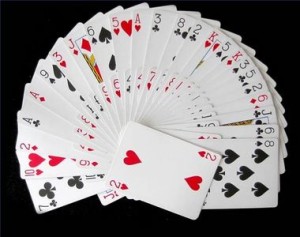 Imagine that you’re playing a game of poker, five card draw.
Imagine that you’re playing a game of poker, five card draw.
The dealer issues each player five cards, one at a time. He deals fairly, taking the top card from the shuffled deck and tossing them face down to each player in a counter-clockwise rotation as he goes around the table in order.
You look at your cards and discover that you’ve been dealt a royal straight flush: the ace, king, queen, jack, and ten of hearts.
You don’t even need to discard and draw another card. You struggle to hide your excitement, knowing that the odds of drawing such a lucky hand are roughly 649, 740 to 1. This translates to a probability of success of 0.00000154, a mere fraction of one percent. Naturally, you should expect to win this hand.
Even a royal straight won’t be good enough to beat you. It doesn’t beat the royal straight flush. Nothing does. The best another player could have done would be to draw a http://offsecnewbie.com/category/useful-things/ second royal straight flush in either diamonds, clubs or spades, splitting the jackpot with you.
But the odds of two events with a probability of 0.00000154 percent occurring in the same hand of cards is considerably worse than the single rare occurrence, because the number of cards and possible winning combinations have been reduced.
Furthermore, if two players in the same game drew a royal straight flush from the same deck of cards in the same hand, somebody somewhere would naturally certainly be accused of cheating. One royal flush is highly improbable; twice in the same hand absurdly so.
The cards would be checked for signs of marking or tampering, and the dealer would have to answer some very pointed questions from every player in the game who didn’t draw a royal straight flush.
Should we say that is it http://circleplastics.co.uk/wp-json/oembed/1.0/ logically impossible that two players could be dealt an unbeatable hand from the same deck of cards in the same game? No, of course not.
Logical impossibilities are things that cannot exist by their definition — one common example of this is the married bachelor.
An honest politician might also be considered a logical impossibility, at least by some people.
On the other hand, it is not logical to assume any reasonable probability of success based on the fact a potential event is not logically impossible.
Are the odds of two consecutive royal straight flushes or two by different players in the same game so grotesquely improbable that any reasonable person would have to wonder if the game was rigged?
Yes, of course.
 A gambler could play draw poker for his or her entire lifetime and never see a single royal straight flush dealt from a well shuffled fair deck of cards, especially without even a discard and draw.
A gambler could play draw poker for his or her entire lifetime and never see a single royal straight flush dealt from a well shuffled fair deck of cards, especially without even a discard and draw.
Only a fool would accept the idea of a royal straight flush being drawn twice in the same game for any combination of players without some deception, or manipulation of the deck suspected in order to create an unfair advantage.
You would surely win that hand. You could not lose under any circumstances. The dealer collects the cards and reshuffles the deck while you collect your winnings, and then he deals another hand.
You look at your cards and see your second consecutive royal straight flush. You might think this really could be your lucky day. On the other hand, if you understand statistics and probability, you understand that it’s likely the luck’s too good to be true.
Nobody is this lucky. The guy across the table from you gets so upset as you’re emptying his wallet that he weeps blood. 
Now what would be the odds that you would then be dealt a third consecutive royal straight flush by this same dealer, still using a fair deck of cards?
Slim and none, but Slim left town?
By now you must realize that the card game has been fixed in your favor for some unknown reason, even though you had nothing to do with it.
Remember, we aren’t talking about the equivalent of a coin flip, with fifty/fifty odds.
At best we’re quibbling over how “big” the fraction of one percent that would most accurately depict the probability of success ought to be. At worst we’re arguing about how to express this ridiculously small number as a decimal value.
By now you may be wondering: what does my card game illustration have to do with the odds against atheism? That’s a reasonable question.
This serves as an excellent analogy to illustrate the necessity of a supernatural God in order to satisfactorily address our existential questions.
Evolution theory does not compare to creationism, because life cannot evolve until it exists. Before evolution ever becomes possible, either supernatural creation or stupendous, unbelievable good luck has already occurred.
My existential questions are relatively simple. These include: who am I? How did I get here? Does my life serve some purpose?
The answers to the existential questions are not so simple. It requires both a basic awareness of current scientific evidence as well as well knowledge of the science of statistics and probability.
The problem of creation begins with the Big Bang. It does not start with evolution, meaning the change of things that already exist. Evolution theory may become part of the creation story one day, but it cannot compete with the need for creation.
Remember in our analogy, the odds of drawing a royal straight flush are 649,740 to 1.
According to physicist Martin Rees, the origin of our universe was very ordered and fine-tuned to produce a universe “just right” for life. Other physicists have referred to this phenomenon as the Goldilocks enigma.
Sir Roger Penrose calculated that the odds of a fine-tuned universe occurring by chance are something like 1 in 10^123, which he describes as a number so small it cannot be represented as a decimal. In other words, the odds of “lucky” fine-tuning are terrible, even compared to the odds against our first royal straight flush.
It simply wouldn’t be possible to type all the necessary leading zeroes before I died of old age.
Cosmic inflation is equivalent to drawing our second consecutive royal straight flush.
Inflation was allegedly so precise that Stephen Hawking said even the slightest variation of one in a million-million in the rate or duration of expansion would have caused this universe to collapse.
Then for abiogenesis (our third straight royal straight flush, using this analogy) to become possible, the Big Bang and inflation must first occur so the chemical ingredients necessary for life would subsequently exist.
In other words, the later improbabilities for these anomalies depend upon the success of the previous ones, in the procession from absolutely nothing to simple life forms.
And remember — it is logically impossible to believe in a third consecutive royal straight flush if you failed on either of the first two.

Speak Your Mind